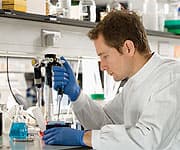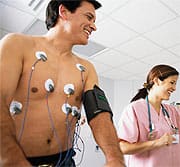Life Extension Magazine®
Back in 2003, longevity scientists became excited when the natural, plant-derived compound resveratrol was found to extend the life span of yeast cells by as much as 70%.1 What got scientists so interested was that the gene expression changes induced by resveratrol in yeast cells were similar to those thought to confer longer life in human beings. Drug development companies are actively seeking to patent resveratrol-like molecules to create pharmaceuticals that would prevent and treat a wide range of age-related diseases, including diabetes, heart disease, cancer, and even Alzheimer’s. The good news for consumers is that they can obtain resveratrol compounds in low-cost dietary supplements today.
Resveratrol BasicsResveratrol is a polyphenol most commonly found in red wine and grapes. It is also found in peanuts, certain berries, some pines, and the roots and stalks of Japanese knotweed.2 Resveratrol plays an important role in the plant’s natural defense system against injury, infection, and disease. Researchers became interested in exploring the health benefits of resveratrol after they observed the surprisingly low rates of heart disease found in populations that consume a diet high in saturated fat and red wine. Today, resveratrol is attracting attention for its unique ability to mimic the gene expression effects of caloric restriction, the only intervention that has been shown in peer-reviewed studies to prolong maximum life span and/or produce anti-aging effects in a variety of organisms, including mice, rats, dogs, and monkeys. These studies suggest that resveratrol may have similar health and longevity benefits in humans. Many people find the prospect of long-term caloric restriction too difficult and uncomfortable. A better option would be to find a means to mimic the beneficial effects of caloric restriction through a healthy, convenient dietary supplement such as resveratrol. Resveratrol: A Caloric-Restriction MimeticA 2003 study at Harvard University found that resveratrol mimics the effects of caloric restriction in yeast cells, boosting their life spans by as much as 70%.3 The following year the researchers went on to demonstrate that resveratrol slows aging in two standard laboratory animals, roundworms and fruit flies.4 That made resveratrol the first compound to show anti-aging effects in widely divergent species. Then in 2006, scientists in Pisa, Italy, showed that resveratrol’s magic could be applied to more advanced animals— large doses of resveratrol extended the life span by more than 50% in a species of fish, Nothobranchius furzeri, which typically lives just nine weeks.5
In a study published in 2006 in the journal Cell, researchers in France found that resveratrol protects mice against diet-induced insulin resistance and obesity.6 Furthermore, mice given the resveratrol supplement demonstrated improved endurance levels during exercise. The researchers also studied the cell-signaling pathway in the mitochondria of these mice. Mitochondria are the power plants of cells, which are responsible for intracellular energy production. Resveratrol activated a protein in the sirtuin family (SIRT1), which then stimulated the activity of another protein involved in mitochondrial function. Other recent studies, including one conducted at the Joslin Diabetes Center, have found another member of the sirtuin family of cellular proteins that may play a major role in how fat is produced and stored, offering a new target for treatments to prevent obesity and reduce the risk of type 2 diabetes.7,8 The French researchers surmised that resveratrol helped control weight gain by enhancing energy expenditure.6 Since the study found a link between sirtuins and energy utilization, the researchers concluded that resveratrol may be helpful in the prevention and treatment of certain metabolic disorders, especially those related to mitochondrial dysfunction, such as Alzheimer’s and Parkinson’s disease—two neurodegenerative conditions that become more prevalent with aging.9 Resveratrol Supports Endothelial HealthRecent experiments have shown that the benefits of resveratrol include improvements in the health of the endothelial tissue lining blood vessels. This holds special significance for long-term cardiovascular health, as atherosclerosis is believed to begin when damage to specialized endothelial cells goes unchecked, leading to an inflammatory condition that culminates in endothelial dysfunction and possible vessel blockage.10-17 Resveratrol also benefits the circulatory system by eliciting a decrease in the oxidation of low-density lipoprotein (LDL); by fostering decreases in platelet aggregation; and by promoting relaxation of small blood vessels called arterioles.18-21 Collectively, these mechanisms benefit the overall health of the cardiovascular system by decreasing factors that contribute to the development of atherosclerosis, and by decreasing the likelihood of undesirable clotting, which, in turn, decreases the risk of stroke.22 Furthermore, new data indicate that resveratrol decreases the incidence of dangerous heart arrhythmias.23
One of the most intriguing of resveratrol’s heart-healthy mechanisms involves the upregulation of endothelial progenitor cells (adult stem cells). There is emerging recognition by medical professionals that these adult stem cells are crucial components of cardiovascular health. In fact, scientists now believe that endothelial progenitor cells may serve as a key indicator of overall circulatory function and predict that levels of these specialized stem cells may one day supplant the lipid profile as the biomarker of choice for cardiovascular disease risk.13,24,25 Research within the past five years has shown that the number and functionality of endothelial progenitor cells, which are critically involved in blood vessel repair, are directly correlated with current and future cardiovascular wellness. To put it simply; the more of these endothelial progenitor cells one has in the general circulation, the more robust one’s cardiovascular health is likely to be. Manufactured in the bone marrow, endothelial progenitor cells are low in patients with diabetes, hypertension, and/or cardiovascular disease, and their functionality decreases significantly with advancing age.26-28 Since the publication in 2003 of an article in the influential New England Journal of Medicine, scientists have increasingly focused on the activities of endothelial progenitor cells. In that landmark report, researchers from the National Institutes of Health noted that there is a “strong correlation” between the number of circulating endothelial progenitor cells and a patient’s Framingham risk factor score.13 The Framingham score is a commonly accepted method of assessing an individual’s 10-year risk of developing coronary heart disease. It takes into account risk factors such as LDL, HDL, and triglyceride levels, age, gender, history of smoking, and other factors. Interestingly, research by Chinese investigators indicates that the influence of cholesterol levels on the development of atherosclerosis (and thus heart disease) may actually relate to the relationship between endothelial progenitor cells and cholesterol. On the heels of the New England Journal of Medicine article, Chinese researchers published a report, which concluded that high LDL may be damaging precisely because it reduces the number and functionality of endothelial progenitor cells.12 Experiments showed, “the number of endothelial progenitor cells was significantly reduced in patients with hypercholesteroemia (extremely high cholesterol levels) compared with that in control subjects.”12 In patients with high total cholesterol and LDL, the ability of endothelial progenitor cells to proliferate, migrate, adhere to vessel walls, and induce the regeneration of vessels was impaired. As cholesterol levels increased, they found, endothelial progenitor cell levels declined. Other investigators found that endothelial progenitor cell levels are depressed among patients with elevated homocysteine.29 Resveratrol, on the other hand, has been shown in the past year to increase the number of these crucial cells in the peripheral circulation, even at doses achievable by moderate red wine intake or through dietary supplementation.11,14,30,31
Resveratrol Produces Favorable Metabolic ChangesIn a landmark mouse study published in the journal Nature, resveratrol countered some effects of a high-calorie diet, improving the health of the mice and increasing their life span, even though they did not lose any weight.32 These mice shared many of the problems of humans on an equivalent diet, including obesity, insulin resistance, and heart disease. The study compared middle-aged mice fed a standard diet with those on a high-fat (60% of daily calories) diet, with and without high-dose resveratrol supplements. Over a two-year period, the resveratrol-fed mice on the high-fat diet lived as long as the ones on a standard diet and at least 15% longer than their untreated, obese peers. How much better off were the treated mice? The resveratrol-treated mice demonstrated improved insulin sensitivity compared with their obese counterparts who did not receive resveratrol, suggesting that resveratrol conferred important benefits for longevity and diabetes prevention.32 Additionally, the resveratrol-treated animals displayed greater numbers of liver mitochondria than animals who consumed a high-fat diet that did not contain resveratrol. The study further suggested that resveratrol might lead to better health and endurance than is usually seen in obese mice. Resveratrol’s exact working mechanism is not yet known with certainty, but the researchers believe it may be activating SIRT1, a sirtuin protein that is thought to be involved with longevity. The mouse studies also hinted that resveratrol induces basic metabolic changes akin to those produced by caloric restriction.6,32 Gene-expression analysis in livers of these aged and overweight mice indicated that resveratrol favorably modified some of the known metabolic pathways that are also affected by caloric restriction.32 Perhaps the most intriguing result of the recent mouse studies was resveratrol’s ability to increase the number of mitochondria, the key cell components that serve as energy producers.6,32 Resveratrol’s ability to restore function to mitochondria is especially exciting because it seems that restored mitochondria are more efficient than the aging mitochondria they replace, are less prone to churn out free radicals, and are more efficient at ridding the body of damaged cells that induce chronic inflammatory reactions. Caloric restriction appears to do the same thing, but is much more difficult to implement and maintain in humans. Resveratrol’s effect on mitochondria may be enough by itself to account for much of the compound’s demonstrable effects in the mouse studies. It may account for the enhanced running abilities observed in the overweight mice treated with resveratrol. What makes the findings of these recent mouse studies so potentially significant to researchers is that humans have genes similar to those linked to resveratrol intake in the mice.6,32 Resveratrol and CancerIn addition to its anti-aging and anti-heart disease effects, resveratrol may promote longevity through another avenue—that of fighting cancer, one of the chief causes of death in older adults. When added to cells cultured in media, resveratrol has been found to inhibit the proliferation of a variety of human cancer cell lines, including those from breast, prostate, stomach, colon, pancreatic, and thyroid cancers.33 In 2004, a team of biochemists at the University of Virginia looked at resveratrol’s role in blocking cancer growth and progression. Resveratrol appears to reduce the activation of nuclear factor-kappab (NF-kb), a protein that has been implicated in cancer by acting like a switch to turn on inflammatory processes.34,35 Resveratrol also enhances cancer cell sensitivity to certain immune cell-induced death mechanisms.34 Nuclear factor-kappab inhibitors like resveratrol may thus have important implications for increasing the effectiveness of anticancer therapies in humans.36 Researchers from the State University of New York at Stony Brook looked at the drinking habits of 360 red and white wine drinkers with similar lifestyles. White wine consumption had no association with colorectal cancer incidence. On the other hand, regular red wine consumption was linked to a 68% reduced risk of the cancer. The researchers believe that resveratrol was most likely the component in wine that was behind the apparent benefits.37 The findings confirmed results from an earlier study conducted by the same group showing that wine consumption reduced colorectal cancer risk by 45%.38 Last year, researchers from the University of Alabama at Birmingham examined resveratrol’s potential in preventing prostate tumors. In the study, published in Carcinogenesis, the mice were given the resveratrol found in one liter of red wine per day. Mice who consumed a diet supplemented with resveratrol had a dramatic eight-fold reduced incidence of poorly differentiated prostatic adenocarcinoma, a type of prostate cancer with a poor prognosis. The mice that experienced the greatest cancer-protection effect consumed resveratrol in a powdered formula mixed with their food for seven months.39 Since it is medically inadvisable to consume one liter of red wine every day, this study points to the importance of resveratrol supplementation as part of prostate cancer defense. An earlier study published in the Journal of Carcinogenesis found that dietary resveratrol helped prevent breast cancer in female rats. Starting at birth, rats were fed either a control diet or a diet supplemented with resveratrol. At the age of 50 days, both groups were exposed to a cancer-inducing chemical. The resveratrol-fed rats were significantly protected against breast cancer, demonstrating fewer tumors per animal and longer tumor latency (an asymptomatic period in this disease process). The researchers concluded, “our work supports the previous reports that resveratrol in the diet is effective at inhibiting…mammary cancer. We have shown that resveratrol can enhance maturation of the mammary gland as well as reduce cellular prolifer-ation and increase apoptosis (programmed cell death) in mammary epithelial cells, in a manner that is protective against mammary carcinogenesis.”40 | |||||
How Much Resveratrol Should You Take?Scientific studies in animals reveal that resveratrol can extend life span, slow aging, and favorably alter gene expression in a manner similar to caloric restriction, the only proven method of extending maximum life span in mammals. These findings suggest that resveratrol supplementation might benefit aging humans. The positive effects of resveratrol have been shown at a wide variety of doses ranging from a few milligrams to over a thousand milligrams daily. For example, a validated model of colon cancer suggests that a human equivalent dose of as little as 2.3 mg of resveratrol daily is protective.43 Other scientific studies investigating the effect of resveratrol on tumor angiogenesis (the formation of new blood vessels that permit rapid tumor growth) indicate that a human equivalent dose range of 14 mg to 1,129 mg of resveratrol may be effective in slowing tumor growth.44,45
An experimental study of cardiac hypertrophy (enlargement of the heart muscle) suggests benefits of a human equivalent dose of 113 mg to 565 mg of resveratrol daily.46 This very same study showed that this wide dose range increased endothelial nitric oxide levels by 76.2% and 90.3%, and decreased artery-constricting levels of angiotensin II by 12.4% and 15.3%, respectively. Nitric oxide is a molecule that is critical for ensuring healthy endothelial (inner arterial wall) function. A 2007 experimental study of heart attack showed that a human equivalent dose of 28 mg improved left ventricular function, decreased heart attack size, and increased activity of the powerful antioxidant superoxide dismutase (SOD).47 Another study showed that a human equivalent dose of 226 mg of resveratrol increased recovery of at-risk heart muscle following a decrease in oxygen and blood supply.48 Studies also support the benefit of resveratrol in strongly counteracting free radical stress. For example, a 2006 study showed that a human equivalent dose of 113 mg improved the contractile response of the urinary bladder and prevented oxidative tissue damage.49 Research supported by the Life Extension Foundation found that the human equivalent dose of 20 mg of resveratrol combined with 100 mg of grapeseed extract mimicked many of the favorable gene expression effects of caloric restriction. The amount of resveratrol found in a glass of red wine has been estimated to be around 4.77 mg, though the actual amount of resveratrol contained in red wine is subject to wide variations.50 If resveratrol is the key active ingredient in red wine that protects vascular health, then moderate red wine drinkers would obtain moderate doses of resveratrol daily. Readers should note that the act of drinking red wine with most meals (as the French do) may play a significant factor in its apparent protection against heart attack. That’s because much of the arterial damage inflicted by poor dietary habits occurs right after the meal is ingested, when the blood stream is saturated with fats and sugars and undergoes oxidative-inflammatory stress. Red wine poylphenols (such as resveratrol) would neutralize some of this after-meal arterial damage. The table on the opposite page summarizes published studies in which a human equivalent dose can be ascertained. Missing from this table are human equivalent doses for some of the spectacular studies that the media has reported on showing that resveratrol significantly extends life span. It is not possible to accurately extrapolate human dose equivalents from these small cell studies, yet some researchers are so confident about the anti-aging potential of resveratrol that they are personally taking doses of 250 mg a day and higher. So the question begs, how much resveratrol a day should you take? Life Extension has demonstrated in a carefully controlled study that 20 mg of resveratrol along with 100 mg of grapeseed extract favorably alters gene expression in a way that might slow aging, protect against age-related degenerative diseases, and extend life span. There remains the intriguing possibility, however, that far higher doses of resveratrol might produce better anti-aging benefits. As a result, dedicated Life Extension members have been increasing their resveratrol intake to 100-300 mg a day and higher. An interesting analogy can be drawn from our experience with coenzyme Q10 (CoQ10) and vitamin D. Japanese doctors initially prescribed only 30 mg of CoQ10 a day for heart disease patients and observed modest improvements. When higher doses of CoQ10 were administered, significantly better results occurred not only for the heart, but also the brain. A 400 IU daily dose of vitamin D was once thought adequate, yet newer studies show that doses ranging from 800 IU to 10,000 IU are needed to make a significant positive impact on one’s health and longevity. While we cannot recommend that aging people exceed 250-400 mg of resveratrol daily, we also cannot argue with the logic of seeking the potential longevity benefits that may be associated with higher-dose resveratrol supplementation. The one factor that is not variable is that we are all aging and very few compounds have been identified that may protect against this pathological phenomenon. The encouraging news for consumers is that resveratrol prices are coming down, and it is now possible for most people to affordably ingest much higher amounts of resveratrol. Table: Resveratrol experimental study data and human equivalent dose:
| |
| References | |
| 1. Viswanathan M, Kim SK, Berdichevsky A, Guarente L. A role for SIR-2.1 regulation of ER stress response genes in determining C. elegans life span. Dev Cell. 2005 Nov;9(5):605-15. 2. Burns J, Yokota T, Ashihara H, Lean ME, Crozier A. Plant foods and herbal sources of resveratrol. J Agric Food Chem. 2002 May 22;50(11):3337-40. 3. Howitz KT, Bitterman KJ, Cohen HY, et al. Small molecule activators of sirtuins extend Saccharomyces cerevisiae lifespan. Nature. 2003 Sep 11;425(6954):191-6. 4. Wood JG, Rogina B, Lavu S, et al. Sirtuin activators mimic caloric restriction and delay ageing in metazoans. Nature. 2004 Aug 5;430(7000):686-9. 5. Valenzano DR, Terzibasi E, Genade T, et al. Resveratrol prolongs lifespan and retards the onset of age-related markers in a short-lived vertebrate. Curr Biol. 2006 Feb 7;16(3):296-300. 6. Lagouge M, Argmann C, Gerhart-Hines Z, et al. Resveratrol improves mitochondrial function and protects against metabolic disease by activating SIRT1 and PGC-1alpha. Cell. 2006 Dec 15;127(6):1109-22. 7. Jing E, Gesta S, Kahn CR. SIRT2 regulates adipocyte differentiation through FoxO1 acetylation/deacetylation. Cell Metab. 2007 Aug;6(2):105-14. 8. Tatar M. SIR2 calls upon the ER. Cell Metab. 2005 Nov;2(5):281-2. 9. Rasouri S, Lagouge M, Auwerx J. SIRT1/PGC-1: a neuroprotective axis? Med Sci (Paris). 2007 Oct;23(10):840-4. 10. Ungvari Z, Orosz Z, Rivera A, et al. Resveratrol increases vascular oxidative stress resistance. Am J Physiol Heart Circ Physiol. 2007 May;292(5):H2417-24. 11. Balestrieri ML, Schiano C, Felice F, et al. Effect of low doses of red wine and pure resveratrol on circulating endothelial progenitor cells. J Biochem (Tokyo). 2007 Nov 4; [Epub ahead of print] 12. Chen JZ, Zhang FR, Tao QM, Wang XX, Zhu JH, Zhu JH. Number and activity of endothelial progenitor cells from peripheral blood in patients with hypercholesterolaemia. Clin Sci (Lond). 2004 Sep;107(3):273-80. 13. Hill JM, Zalos G, Halcox JP, et al. Circulating endothelial progenitor cells, vascular function, and cardiovascular risk. N Engl J Med. 2003 Feb 13;348(7):593-600. 14. Wang XB, Huang J, Zou JG, et al. Effects of resveratrol on number and activity of endothelial progenitor cells from human peripheral blood. Clin Exp Pharmacol Physiol. 2007 Nov;34(11):1109-15. 15. Wood JG, Rogina B, Lavu S, et al. Sirtuin activators mimic caloric restriction and delay ageing in metazoans. Nature. 2004 Aug 5;430(7000):686-9. 16. Ballard VL, Edelberg JM. Targets for regulating angiogenesis in the ageing endothelium. Expert Opin Ther Targets. 2007 Nov;11(11):1385-99. 17. Simionescu M, Simionescu N. Proatherosclerotic events: pathobiochemical changes occurring in the arterial wall before monocyte migration. FASEB J. 1993 Nov;7(14):1359-66. 18. Nagaoka T, Hein TW, Yoshida A, Kuo L. Resveratrol, a component of red wine, elicits dilation of isolated porcine retinal arterioles: role of nitric oxide and potassium channels. Invest Ophthalmol Vis Sci. 2007 Sep;48(9):4232-9. 19. Thirunavukkarasu M, Penumathsa SV, Koneru S, et al. Resveratrol alleviates cardiac dysfunction in streptozotocin-induced diabetes: Role of nitric oxide, thioredoxin, and heme oxygenase. Free Radic Biol Med. 2007 Sep 1;43(5):720-9. 20. Cullen JP, Morrow D, Jin Y, et al. Resveratrol inhibits expression and binding activity of the monocyte chemotactic protein-1 receptor, CCR2, on THP-1 monocytes. Atherosclerosis. 2007 Nov;195(1):e125-33. 21. Wu CC, Wu CI, Wang WY, Wu YC. Low concentrations of resveratrol potentiate the antiplatelet effect of prostaglandins. Planta Med. 2007 May;73(5):439-43. 22. Opie LH, Lecour S. The red wine hypothesis: from concepts to protective signalling molecules. Eur Heart J. 2007 Jul;28(14):1683-93. 23. Chen WP, Su MJ, Hung LM. In vitro electrophysiological mechanisms for antiarrhythmic efficacy of resveratrol, a red wine antioxidant. Eur J Pharmacol. 2007 Jan 12;554(2-3):196-204. 24. Urbich C, Dimmeler S. Endothelial progenitor cells: characterization and role in vascular biology. Circ Res. 2004 Aug 20;95(4):343-53. 25. Schmidt-Lucke C, Rössig L, Fichtlscherers S, et al. Reduced number of circulating endothelial progenitor cells predicts future cardiovascular events: proof of concept for the clinical importance of endogenous vascular repair. Circulation. 2005 Jun 7;111(22):2981-7. 26. Chang EI, Loh SA, Ceradini DJ, et al. Age Decreases Endothelial Progenitor Cell Recruitment Through Decreases in Hypoxia-Inducible Factor 1{alpha} Stabilization During Ischemia. Circulation. 2007 Nov 26. 27. Oliveras A, Soler MJ, Martinez-Estrada OM, et al. Endothelial progenitor cells are reduced in refractory hypertension. J Hum Hypertens. 2007 Nov 8. 28. Kawamoto A, Asahara T. Role of progenitor endothelial cells in cardiovascular disease and upcoming therapies. Catheter Cardiovasc Interv. 2007 Oct 1;70(4):477-84. 29. Zhu J, Wang X, Chen J, Sun J, Zhang F. Reduced number and activity of circulating endothelial progenitor cells from patients with hyperhomocysteinemia. Arch Med Res. 2006 May;37(4):484-9. 30. Lefèvre J, Michaud SE, Haddad P, et al. Moderate consumption of red wine (cabernet sauvignon) improves ischemia-induced neovascularization in ApoE-deficient mice: Effect on endothelial progenitor cells and nitric oxide. FASEB J. 2007 Jul 19. 31. J G, Cq W, Hh F, et al. Effects of resveratrol on endothelial progenitor cells and their contributions to reendothelialization in intima-injured rats. J Cardiovasc Pharmacol. 2006 May;47(5):711-21. 32. Baur JA, Pearson KJ, Price NL, et al. Resveratrol improves health and survival of mice on a high-calorie diet. Nature. 2006 Nov 16;444(7117):337-42. 33. Aggarwal BB, Bhardwaj A, Aggarwal RS, et al. Role of resveratrol in prevention and therapy of cancer: preclinical and clinical studies. Anticancer Res. 2004 Sep;24(5A):2783-840. 34. Yeung F, Hoberg JE, Ramsey CS, et al. Modulation of NF-kappaB-dependent transcription and cell survival by the SIRT1 deacetylase. EMBO J. 2004 Jun 16;23(12):2369-80. 35. Ahn KS, Aggarwal BB. Transcription Factor NF-{kappa}B: A Sensor for Smoke and Stress Signals. Ann N Y Acad Sci. 2005 Nov;1056:218-33. 36. Yu H, Pan C, Zhao S, Wang Z, Zhang H, Wu W. Resveratrol inhibits tumor necrosis factor-alpha-mediated matrix metalloproteinase-9 expression and invasion of human hepatocellular carcinoma cells. Biomed Pharmacother. 2007 Oct 22; [Epub ahead of print]. 37. Available at: http://www.webmd.com/colorectal-cancer/news/20061024/red-wine-vs-colon-cancer. Accessed November 27, 2007. 38. Anderson JC, Alpern Z, Sethi G, et al. Prevalence and risk of colorectal neoplasia in consumers of alcohol in a screening population. Am J Gastroenterol. 2005 Sep;100(9):2049-55. 39. Harper CE, Patel BB, Wang J, et al. Resveratrol suppresses prostate cancer progression in transgenic mice. Carcinogenesis. 2007 Sep;28(9):1946-53. 40. Whitsett T, Carpenter M, Lamartiniere CA. Resveratrol, but not EGCG, in the diet suppresses DMBA-induced mammary cancer in rats. J Carcinog. 2006 May 15;5:15. 41. Olson ER, Naugle JE, Zhang X, Bomser JA, Meszaros JG. Inhibition of cardiac fibroblast proliferation and myofibroblast differentiation by resveratrol. Am J Physiol Heart Circ Physiol. 2005 Mar;288(3):H1131-8. 42. Available at: http://www.sciencedaily.com/releases/2004/12/041208082150.htm#. Accessed November 6, 2007. 43. Tessitore L, Davit A, Sarotto I, Caderni G. Resveratrol depresses the growth of colorectal aberrant crypt foci by affecting bax and p21(CIP) expression. Carcinogenesis. 2000 Aug;21(8):1619-22. 44. Kimura Y, Okuda H. Resveratrol isolated from Polygonum cuspidatum root prevents tumor growth and metastasis to lung and tumor-induced neovascularization in Lewis lung carcinoma-bearing mice. J Nutr. 2001 Jun;131(6):1844-9. 45. Tseng SH, Lin SM, Chen JC, et al. Resveratrol suppresses the angiogenesis and tumor growth of gliomas in rats. Clin Cancer Res. 2004 Mar 15;10(6):2190-202. 46. Liu Z, Song Y, Zhang X, et al. Effects of trans-resveratrol on hypertension-induced cardiac hypertrophy using the partially nephrectomized rat model. Clin Exp Pharmacol Physiol. 2005 Dec;32(12):1049-54. 47. Thirunavukkarasu M, Penumathsa SV, Koneru S, et al. Resveratrol alleviates cardiac dysfunction in streptozotocin-induced diabetes: Role of nitric oxide, thioredoxin, and heme oxygenase. Free Radic Biol Med. 2007 Sep 1;43(5):720-9. 48. Dernek S, Ikizler M, Erkasap N, et al. Cardioprotection with resveratrol pretreatment: improved beneficial effects over standard treatment in rat hearts after global ischemia. Scand Cardiovasc J. 2004 Aug;38(4):245-54. 49. Toklu H, Alican I, Ercan F, Sener G. The beneficial effect of resveratrol on rat bladder contractility and oxidant damage following ischemia/reperfusion. Pharmacology. 2006;78(1):44-50. 50. Available at: http://www.lifeextension.com/magazine/mag2007/mar2007_report_resveratrol_01.htm. Accessed November 28, 2007. 51. Chen Y, Tseng SH, Lai HS, Chen WJ. Resveratrol-induced cellular apoptosis and cell cycle arrest in neuroblastoma cells and antitumor effects on neuroblastoma in mice. Surgery. 2004 Jul;136(1):57-66. 52. Bradamante S, Barenghi L, Piccinini F, et al. Resveratrol provides late-phase cardioprotection by means of a nitric oxide- and adenosine-mediated mechanism. Eur J Pharmacol. 2003 Mar 28;465(1-2):115-23. 53. Floreani M, Napoli E, Quintieri L, Palatini P. Oral administration of trans-resveratrol to guinea pigs increases cardiac DT-diaphorase and catalase activities, and protects isolated atria from menadione toxicity. Life Sci. 2003 May 2;72(24):2741-50. 54. Penumathsa SV, Thirunavukkarasu M, Koneru S, et al. Statin and resveratrol in combination induces cardioprotection against myocardial infarction in hypercholesterolemic rat. J Mol Cell Cardiol. 2007 Mar;42(3):508-16. 55. Das S, Fraga CG, Das DK. Cardioprotective effect of resveratrol via HO-1 expression involves p38 map kinase and PI-3-kinase signaling, but does not involve NFkappaB. Free Radic Res. 2006 Oct;40(10):1066-75. 56. Das S, Khan N, Mukherjee S, et al. Redox regulation of resveratrol-mediated switching of death signal into survival signal. Free Radic Biol Med. 2008 Jan 1;44(1):82-90. 57. Shen MY, Hsiao G, Liu CL, et al. Inhibitory mechanisms of resveratrol in platelet activation: pivotal roles of p38 MAPK and NO/cyclic GMP. Br J Haematol. 2007 Nov;139(3):475-85. 58. Elmalı N, Esenkaya I, Karada N, Tas F, Elmali N. Effects of resveratrol on skeletal muscle in ischemia-reperfusion injury. Ulus Travma Acil Cerrahi Derg. 2007 Oct;13(4):274-80. 59. Mokni M, Elkahoui S, Limam F, Amri M, Aouani E. Effect of resveratrol on antioxidant enzyme activities in the brain of healthy rat. Neurochem Res. 2007 Jun;32(6):981-7. 61. Ingram DK, Anson RM, de Cabo R, et al. Development of calorie restriction mimetics as a prolongevity strategy. Ann NY Acad Sci. 2004 Jun;1019:412-23. 62. Lin SJ, Defossez PA, Guarente L. Requirement of NAD and SIR2 for life-span extension by calorie restriction in Saccharomyces cerevisiae. Science. 2000 Sep 22;289(5487):2126-8. 63. Mattison JA, Lane MA, Roth GS, Ingram DK. Calorie restriction in rhesus monkeys. Exp Gerontol. 2003 Jan;38(1-2):35-46. 64. Meyer TE, Kovacs SJ, Ehsani AA, et al. Long-term caloric restriction ameliorates the decline in diastolic function in humans. J Am Coll Cardiol. 2006 Jan 17;47(2):398-402. 65. Heilbronn LK, de JL, Frisard MI, et al. Effect of 6-month calorie restriction on biomarkers of longevity, metabolic adaptation, and oxidative stress in overweight individuals: a randomized controlled trial. JAMA. 2006 Apr 5;295(13):1539-48. 66. Fontana L, Klein S. Aging, adiposity, and calorie restriction. JAMA. 2007 Mar 7;297(9):986-94. 67. Crowell JA, Korytko PJ, Morrissey RL, Booth TD, Levine BS. Resveratrol-associated renal toxicity. Toxicol Sci. 2004 Dec;82(2):614-9. 68. Data on file. |










